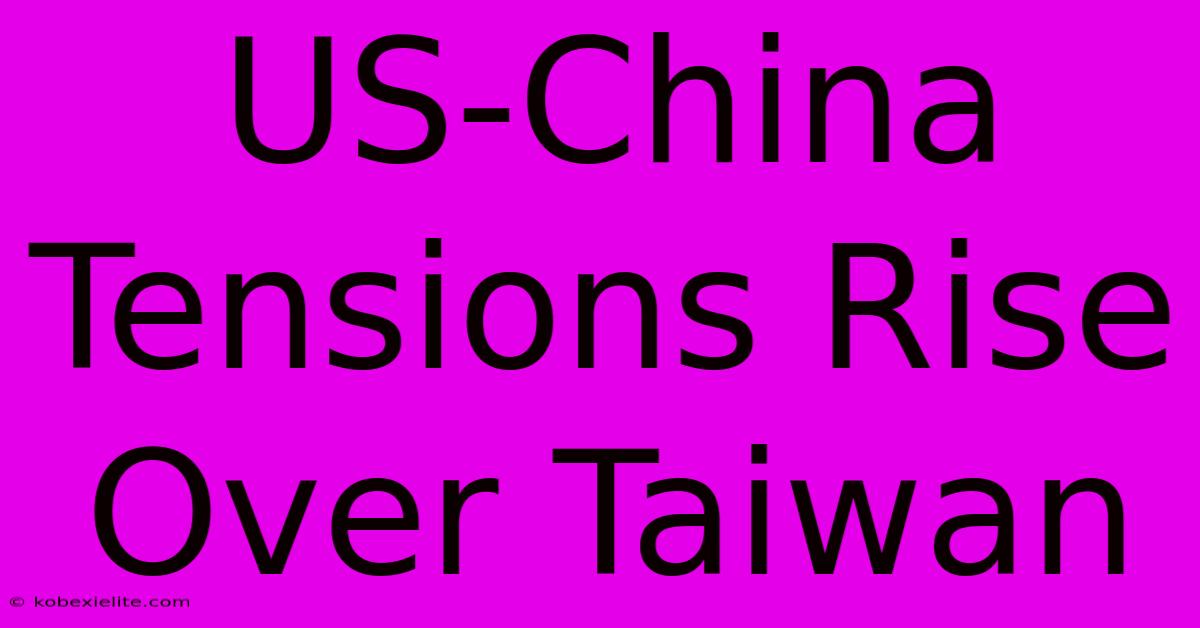US-China Tensions Rise Over Taiwan

Discover more detailed and exciting information on our website. Click the link below to start your adventure: Visit Best Website mr.cleine.com. Don't miss out!
Table of Contents
US-China Tensions Rise Over Taiwan: A Looming Crisis?
The relationship between the United States and China has become increasingly strained in recent years, with Taiwan emerging as a significant flashpoint. This small island nation, officially the Republic of China, is claimed by the People's Republic of China (PRC) as a breakaway province, a claim that forms the bedrock of Beijing's assertive foreign policy in the region. Understanding the complexities of this situation is crucial to grasping the potential for future conflict.
The Historical Context of Taiwan
The history of Taiwan is intertwined with the tumultuous 20th-century history of China. Following the Chinese Civil War, the Kuomintang (KMT) government, led by Chiang Kai-shek, retreated to Taiwan in 1949 after losing to the Communist Party of China (CCP). For decades, both sides claimed to be the legitimate government of all of China, a situation that created a unique geopolitical stalemate.
However, since the late 1970s, the global community has largely recognized the PRC as the sole legitimate government of China, a shift solidified by the US's formal recognition of the PRC in 1979. Despite this, the US maintains unofficial relations with Taiwan, providing it with defensive weaponry under the Taiwan Relations Act. This ambiguous relationship lies at the heart of the current tensions.
The Rise of China and Taiwan's Strategic Importance
China's economic and military rise has emboldened its stance on Taiwan. The PRC views the "Taiwan question" as a matter of national sovereignty and territorial integrity, emphasizing the need for "reunification," a term often interpreted as implying forceful annexation. This assertive posture has been coupled with increased military activity around Taiwan, including regular air incursions into Taiwan's air defense identification zone (ADIZ).
Taiwan's strategic location in the East and South China Seas makes it a vital node for global trade and communication. Control of Taiwan would significantly bolster China's military power projection capabilities in the region and provide access to crucial semiconductor manufacturing facilities, vital to global technology supply chains. This economic and strategic importance amplifies the stakes for both the US and China.
Specific Actions Fueling Tensions:
- Military Drills: China's increasingly frequent and large-scale military exercises near Taiwan are a clear demonstration of its resolve. These drills often involve live-fire exercises and simulate an invasion scenario, sending a strong message to both Taiwan and the US.
- Diplomatic Isolation: China has been actively working to diplomatically isolate Taiwan, reducing the number of countries that formally recognize Taiwan as an independent nation.
- Economic Pressure: Economic coercion, including restrictions on Taiwanese businesses and trade, is another tool used by China to exert pressure on the island.
- Increased Cyber Attacks: The frequency and sophistication of cyberattacks targeting Taiwan's infrastructure suggest an escalating digital dimension to the conflict.
The US Response and the Risk of Escalation
The US response to China's actions has been multifaceted. While maintaining its “strategic ambiguity” policy – avoiding a clear commitment to defend Taiwan militarily in the event of an attack – the US has increased arms sales to Taiwan and strengthened its military presence in the region. This includes closer cooperation with regional allies such as Japan and Australia.
However, the US's commitment to Taiwan remains a point of contention. Any direct military intervention by the US to defend Taiwan would carry significant risks of escalating the conflict into a full-blown war with potentially devastating consequences. This is a major concern for policymakers on both sides.
The Future of US-China Relations and the Taiwan Question
The future of US-China relations and the fate of Taiwan remain uncertain. The situation is characterized by a delicate balance of power, strategic ambiguity, and the potential for miscalculation. Managing this complex dynamic requires careful diplomacy, clear communication, and a commitment to de-escalation. Failure to navigate these challenges effectively could lead to a serious regional conflict with global ramifications.
Keywords: US-China relations, Taiwan, Taiwan Strait, China, United States, military, tensions, conflict, geopolitical, strategic ambiguity, Taiwan Relations Act, South China Sea, East China Sea, reunification, independence, economic coercion, military drills, cyber attacks, semiconductors.

Thank you for visiting our website wich cover about US-China Tensions Rise Over Taiwan. We hope the information provided has been useful to you. Feel free to contact us if you have any questions or need further assistance. See you next time and dont miss to bookmark.
Featured Posts
-
Vius 8 25 M Childcare Project Fails
Feb 18, 2025
-
Logan Thompsons Short Canada Stint
Feb 18, 2025
-
Perth Obstetrician Rhys Bellinge Charged
Feb 18, 2025
-
Patrick Shares Emotional Video Message
Feb 18, 2025
-
Snl 50 Mc Cartneys Beatles Medley
Feb 18, 2025
